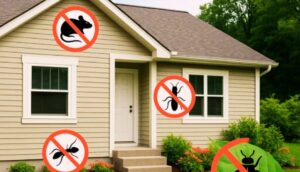Eco-Friendly Mosquito Control for Yards: Keep Pests Away Naturally

Mosquitoes have a way of turning a quiet evening or night in the yard into an itchy, buzzing nightmare. These little pests aren’t just irritating—they can also spread harmful diseases. Most people grab chemical sprays for a quick fix, but those harsh products can put your pets, beneficial insects, and even your family at risk.
I’ve had my fair share of mosquito-filled evenings, and I know how frustrating it is when their nonstop buzzing around your head forces you back indoors. If you’ve ever felt the same, you understand just how discouraging it can be.
The good news? You don’t have to surrender your yard to mosquitoes. There are safe, natural ways to fight back so you can enjoy your time outside again. With the right eco-friendly mosquito control for yards, you can reclaim your mornings, evenings, and every moment in between—without chemicals, without worry, and without giving up the comfort of your outdoor space.
In this guide, we’ll walk through natural methods, safe products, and smart landscaping tips. You’ll learn how to reduce mosquitoes without harsh chemicals and create a yard that’s both beautiful and comfortable.
Why Choose Eco-Friendly Mosquito Control?
Mosquito control is about more than comfort. It’s about health and sustainability. Here’s why eco-friendly options are worth it:
-
Safe for pets and children – No toxic residues where kids play or pets roam.
-
Protects pollinators – Bees and butterflies aren’t harmed.
-
Better for the environment – Avoids chemical runoff that can contaminate water.
-
Long-term results – Many natural methods prevent mosquitoes before they hatch.
By going green, you protect both your yard and the planet.
🪴 Comparison Chart: Eco-Friendly Mosquito Control for Yards
| Method | How It Works | Pros | Cons | Best For |
|---|---|---|---|---|
| Mosquito Dunks (BTI) | Natural bacteria kill larvae in standing water | Safe for pets, kids, fish, and wildlife | Only works in water (not for adult mosquitoes) | Birdbaths, ponds, rain barrels |
| Garlic Spray | Strong scent repels mosquitoes | Affordable, easy DIY option | Needs frequent reapplication after rain | Vegetable gardens, small yards |
| Neem Oil | Natural oil disrupts the mosquito life cycle | Biodegradable, safe for plants | Can be pricey, needs mixing | Gardens, flowerbeds |
| Citronella & Repellent Plants | Strong fragrance deters mosquitoes | Beautiful landscaping, dual purpose | Works best when leaves are crushed or oils extracted | Patios, walkways, and seating areas |
| Fans & Airflow | Mosquitoes can’t fly against the wind | Instant relief, no chemicals | Only covers a limited space | Decks, patios, porches |
| Bat or Bird Houses | Natural predators eat mosquitoes | Long-term, eco-friendly solution | Takes time to attract wildlife | Larger yards, natural settings |
| Mosquito Traps (Eco-Friendly) | Lures mosquitoes with light or CO₂ | Targets adults, safe for pollinators | Needs maintenance and a power source | Backyards, outdoor entertaining areas |
| Essential Oil Sprays | Plant oils (eucalyptus, peppermint, lavender) | Natural, pleasant smell, safe for skin | Short-lasting, frequent reapplication needed | Personal use outdoors |
| Cedarwood Mulch/Chips | Aroma repels mosquitoes in soil | Dual-purpose landscaping + mosquito deterrent | Needs refreshing over time | Garden beds, flower borders |
| Yellow Bug Lights | Doesn’t attract mosquitoes | Cheap, easy to install | Doesn’t actively repel; only reduces attraction | Outdoor lighting areas |
Step 1: Get Rid of Mosquito Breeding Spots
Mosquitoes can’t reproduce without standing water. By eliminating these hotspots, you can drastically lower their numbers in your yard.
-
Empty containers – Buckets, flowerpot saucers, toys, or any small item that collects rainwater can become mosquito nurseries.
-
Clean gutters – Gutters that are clogged hold water and attract larvae.
-
Refresh birdbaths – Swap out the water every few days to prevent mosquito eggs from hatching.
-
Check hidden corners – Even small items like bottle caps, plant trays, or old tires can hold enough water to support mosquito growth.
Taking these simple steps can reduce mosquito populations by as much as 70%, giving you a much more comfortable outdoor space.
Step 2: Use Natural Yard Treatments
Instead of relying on harsh chemical sprays, eco-friendly treatments can keep mosquitoes at bay while staying safe for the environment.
-
Mosquito dunks – These small tablets contain Bacillus thuringiensis israelensis (BTI), a natural bacterium that kills mosquito larvae. They’re completely safe for pets, birds, and fish.
-
Garlic sprays – Mosquitoes dislike the smell of garlic, making this an effective and natural deterrent.
-
Neem oil – A biodegradable option that repels mosquitoes and other pests without harming your plants.
-
Cedarwood chips – Spread around garden beds or walkways, cedarwood naturally keeps mosquitoes and other biting insects away.
Using these methods keeps your yard chemical-free while still targeting mosquitoes effectively.
Step 3: Plant Mosquito-Repelling Flora
Certain plant species emit specific scents that mosquitoes can’t stand. Planting them not only helps with pest control but also enhances your garden’s beauty.
-
Citronella grass – Known for the citronella oil that drives mosquitoes away.
-
Lavender – Its lovely scent is pleasant to humans but detested by mosquitoes.
-
Lemongrass – The citrusy aroma naturally keeps mosquitoes at bay.
-
Mint – Easy to grow and doubles as a flavorful herb for your kitchen.
-
Marigolds – Their bright blooms contain compounds that repel mosquitoes.
For the best results, plant them near patios, outdoor seating areas, or along pathways to create mosquito-free zones where you spend the most time.
Step 4: Encourage Natural Mosquito Predators
Nature provides its own mosquito control agents. By attracting these helpful creatures, you can reduce mosquito numbers without any chemicals.
-
Birds – Purple martins, swallows, and other insect-eating birds consume hundreds of mosquitoes every day. Installing birdhouses makes your yard more inviting to them.
-
Bats – A single bat can devour thousands of insects in one night. A bat house tucked in a quiet corner of your yard can be a big help.
-
Dragonflies – Nicknamed “mosquito hawks,” dragonflies eat both adult mosquitoes and larvae. A small water feature or pond attracts them naturally.
-
Frogs – Frogs feed on larvae in ponds or water gardens, helping keep mosquito populations under control.
Working with nature is one of the safest and most sustainable ways to maintain a mosquito-free yard.
Step 5: Choose Eco-Friendly Personal Repellents
Protecting yourself while outdoors is just as important as treating your yard. Swap chemical-heavy repellents for safer, plant-based alternatives.
-
Lemon eucalyptus oil – One of the most effective natural mosquito repellents, lasting several hours.
-
Soybean oil sprays – long-lasting, safe, and gentle on your skin.
-
Essential oil blends – Mix oils like lavender, peppermint, and tea tree with water for a DIY mosquito spray.
-
Wearable repellents – Bracelets or bands infused with citronella or geraniol give extra protection when you’re on the move.
These eco-friendly options are effective, safe, and free from harsh chemicals, making them perfect for outdoor gatherings, gardening, or simply enjoying a quiet evening in your yard.
Step 6: Mosquito-Repelling Yard Accessories
A few smart yard additions can reduce mosquito activity without using pesticides.
-
Fans – Mosquitoes are weak fliers. A simple box fan on your porch keeps them away.
-
Yellow bug lights – These bulbs don’t attract mosquitoes like regular lights do.
-
Mosquito traps – Eco-friendly traps lure mosquitoes without chemicals.
-
Screened enclosures – Perfect for patios and decks, keeping bugs out while letting fresh air in.
Combine these with natural methods for maximum comfort.
Step 7: Maintain Your Lawn and Landscape
A tidy yard makes it harder for mosquitoes to hide.
-
Mow grass regularly – Mosquitoes rest in tall grass.
-
Trim bushes – Overgrown shrubs provide shade and humidity.
-
Rake leaves – Piles hold moisture and attract pests.
-
Aerate soil – Prevents puddles from forming after rain.
Regular maintenance will not only control mosquitoes but will also boost curb appeal, which is a plus for you.
In case you missed it, here are our recent articles on mosquito control
- Do mosquitoes prefer a certain type of blood
- Best mosquito options after flooding
- Plants that repel mosquitoes
- Home mosquito control
10 Frequently Asked Questions (FAQs)
1. Do eco-friendly mosquito controls really work?
Yes. While they may not eliminate every mosquito, eco-friendly methods reduce populations significantly when used consistently.
2. Are mosquito dunks safe for pets?
Absolutely. BTI mosquito dunks are non-toxic to pets, birds, fish, and beneficial insects.
3. Can plants alone keep mosquitoes away?
Plants help, but they’re most effective when combined with other methods like water control and repellents.
4. What’s the best natural mosquito repellent for humans?
Lemon eucalyptus oil is one of the most effective plant-based repellents.
5. How often should I reapply natural sprays?
Most natural sprays last 1–3 hours. Reapply as the need arises, especially after swimming or sweating.
6. Can bat houses help with mosquito control?
Yes, but results vary. Bats eat many insects, including mosquitoes, but they don’t rely on mosquitoes alone for food.
7. Is garlic spray safe for vegetable gardens?
Yes. Garlic spray is non-toxic and won’t harm vegetables, though it may leave a light smell temporarily.
8. Can mosquito traps harm bees or butterflies?
Eco-friendly traps are designed to target mosquitoes specifically, making them safe for pollinators.
9. How quickly will eco-friendly methods show results?
You may notice fewer mosquitoes within a week, but full results usually take a few weeks of consistent use.
10. Do eco-friendly solutions cost more than chemicals?
Not always. Many natural methods—like removing water or planting repellent plants—are low-cost or even free.
Conclusion: A Safer Way to Enjoy Your Yard
Mosquitoes may be relentless, but you don’t need to drench your yard in chemicals to fight back. With a mix of natural repellents, smart landscaping, and eco-friendly products, you can enjoy your outdoor spaces without worry.
By choosing eco-friendly mosquito control for yards, you protect your health, your family, and the environment. Small changes like eliminating standing water, planting citronella, and encouraging natural predators can make a big difference.
So, the next time you plan a barbecue, pool party, or quiet evening outdoors, you’ll have peace of mind knowing your yard is protected the natural way.
Want your yard mosquito-free the eco-friendly way? Start today with one or two methods from this guide, and watch your outdoor comfort grow.










Thanks for all these great tips. I didn’t realize that mosquitoes can breed in something as small as a bottle top, so we will need to watch for this. Also I take it they don’t breed in pools because of the chlorine. Am I correct in saying this?
I love the smell of mint, so I am definitely going to be growing more of this in our garden so that we can go back to outdoor cooking in the summer without being bothered by these pesky critters.
Nope—mosquitoes won’t breed in a well-kept swimming pool. Thanks to chlorine and regular filtration, your pool water stays moving and sanitized, which makes it an unfriendly environment for mosquito eggs and larvae. These pests prefer still, stagnant water where they can lay eggs and their young can thrive. If a pool is neglected, however—meaning the water isn’t filtered, cleaned, or chlorinated properly—it can quickly turn into a mosquito nursery.